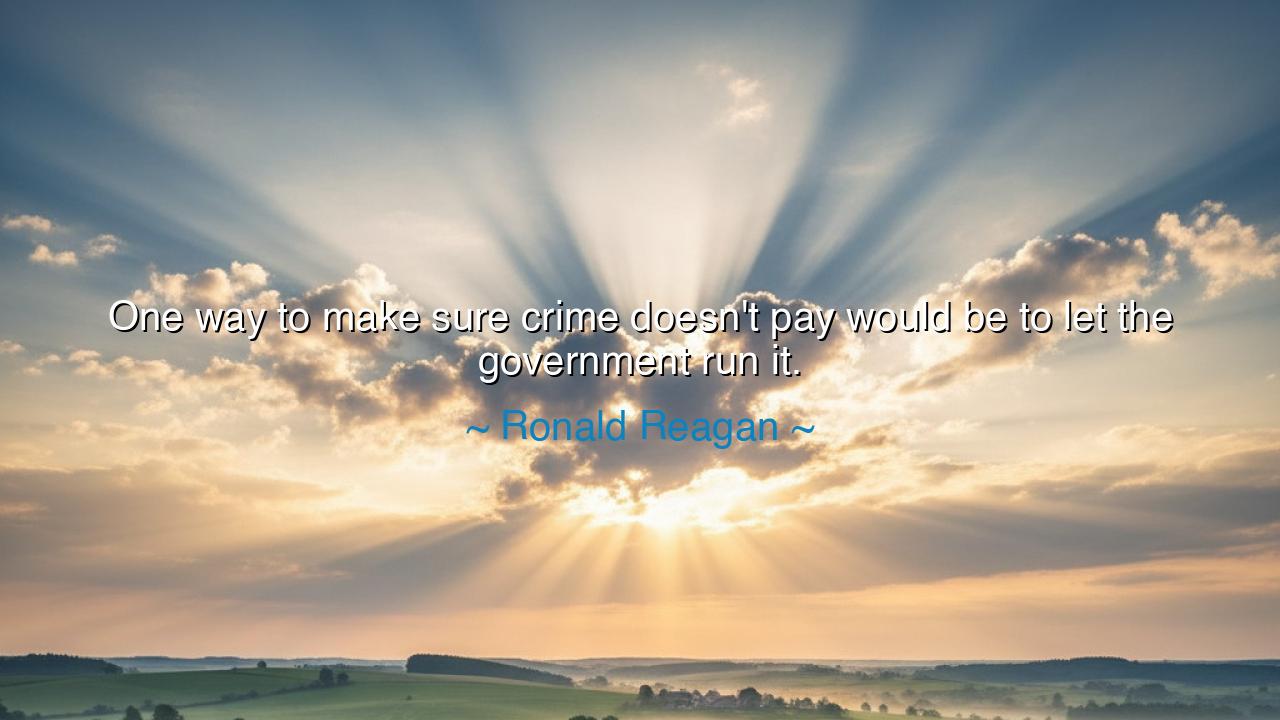
One way to make sure crime doesn't pay would be to let the






"One way to make sure crime doesn't pay would be to let the government run it." – Ronald Reagan
In this witty yet piercing statement, Ronald Reagan, the 40th President of the United States, reveals both his humor and his deep skepticism toward bureaucratic inefficiency. Beneath the laughter lies a serious truth: government, when overextended, often turns success into failure. What Reagan means is that when the state assumes control over enterprises or industries that belong to the realm of personal initiative and accountability, it drains them of vitality. His irony cuts to the heart of human nature—when responsibility is diffused across countless officials, and ownership is absent, excellence fades and corruption festers.
The origin of this quote lies in Reagan’s long crusade against big government and his unwavering belief in the power of the free market. Before entering politics, Reagan had witnessed decades of expansion in federal programs, regulation, and spending. As president, he championed policies that sought to return power to individuals and businesses, convinced that prosperity flows from freedom, not control. His humor often masked profound political philosophy. By likening government-run operations to “crime,” he did not accuse it of evil intent, but rather of inefficiency so disastrous that it destroys even the crooked profits of wrongdoing.
Reagan’s words can be seen as a continuation of a truth recognized since antiquity: that the larger and more centralized authority becomes, the further it drifts from effectiveness. The Roman Empire, once built on discipline and civic duty, fell into decay when its bureaucracy grew bloated and corrupt. Offices that once upheld justice began selling favors, and laws that once served the people became tools for exploitation. In this way, the empire became a parody of itself—its “government” choking the very society it was meant to sustain. Reagan’s quote captures that same timeless irony: even what might seem profitable turns barren when placed in the hands of an unaccountable machine.
To understand this more clearly, consider the Soviet Union in the 20th century. Under its centrally planned economy, every aspect of life—food, production, labor—was directed by the state. In theory, it promised equality and order; in practice, it produced scarcity and waste. Corruption was rampant, not because people were inherently wicked, but because the system removed personal incentive and accountability. Factories inflated numbers to please superiors, officials hoarded privileges, and ordinary citizens waited in endless lines for bread. If crime had been a government enterprise, indeed, it would not have paid—it would have collapsed beneath its own inefficiency, just as Communism eventually did.
Yet Reagan’s observation was not made in cynicism, but in defense of self-reliance, integrity, and liberty. He believed that the strength of a nation lies in its people—the builders, the dreamers, the risk-takers who strive for better without being smothered by control. His humor was a weapon against complacency, reminding citizens that whenever government tries to solve every problem, it often creates new ones. Crime, like all forms of corruption, thrives in shadows; but bureaucracy, with its mountains of paper and rules, can create shadows even without ill intent.
Reagan’s wisdom also speaks to the moral dimension of work. When people own their actions—whether honest labor or wrongdoing—they face consequences directly. But when systems grow vast and faceless, responsibility dissolves. Thus, the individual’s sense of virtue weakens. The free market, despite its flaws, keeps men honest through competition and consequence; government overreach, even with noble intentions, too often removes both. His jest reminds us that freedom demands accountability, and that efficiency, morality, and prosperity thrive only when individuals are empowered to act with ownership and purpose.
The lesson, then, is both simple and profound: what is managed best is what is owned personally. When responsibility belongs to all, it belongs to none. A nation’s greatness comes not from expanding the state’s reach, but from nurturing the strength, ingenuity, and integrity of its people.
And so, the practical actions are these: value personal initiative above regulation; hold yourself accountable in all work; resist the comfort of dependency and the illusion that government can solve what only effort and virtue can. For as Reagan reminds us with humor and wisdom, the machinery of the state may control, but it cannot create; it may spend, but it cannot earn; and if ever it were to run crime itself—it would surely fail, and perhaps even send it into bankruptcy.






AAdministratorAdministrator
Welcome, honored guests. Please leave a comment, we will respond soon